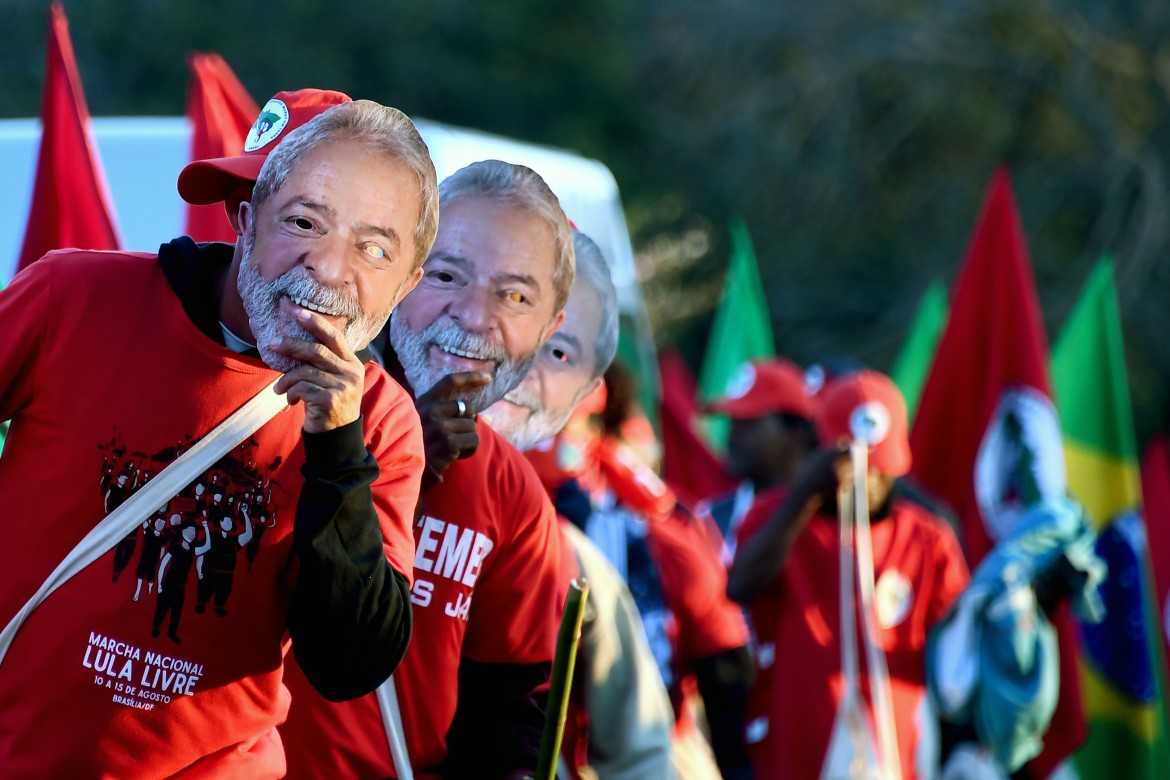Commentary
A partisan judiciary is testing democracy in Brazil
On Friday, a Brazilian elections tribunal ruled that Lula da Silva was ineligible to run for president because of a court sentence for corruption, despite the fact that he has not exhausted his appeals. The political calculus is clear: barred from campaigning, his chances are weakened.

Lula has been barred from the Brazilian presidential elections on Oct. 7. The Supreme Electoral Tribunal ruling on Friday night, with a majority of 6-1, confirmed everyone’s fears. Luiz Inácio da Silva, who is the most popular candidate in the polls, with about 38 percent support verses 18 percent for his nearest challenger, will not be allowed to run in the presidential election because “he has been sentenced (to 12 years) for corruption and money laundering by an appeals court.”
Like the previous sentences passed against him, this is also a clearly political one. It denies Lula the right—which the United Nations upheld two weeks ago—to run for the office of president before a final conviction by the courts.
The former president still has a few avenues: an appeal before the Superior Court of Justice (a higher-level court) and two before the Supreme Court (the highest level of the judiciary). It has been clear for months that the judges in the Lava Jato case and the ministers in the coup-installed Temer government intended to politically assassinate Lula, by means of a judiciary branch that shows very little independence. This has been obvious since April, when the former president was initially convicted based solely on purported “confessions” by others and without any concrete evidence.
This latest sentence builds an impassable wall around the Curitiba federal prison, where former President Lula is being held. He is not allowed to participate in debates or speak out directly in election ads, and the ruling forbids putting up campaign posters with his image.
These measures—rapidly approved at the behest of Minister Rosa Weber, the president of the Supreme Electoral Tribunal (TSE)—are aimed at preventing Lula from campaigning until Sept. 17, the last date on which the former president’s party, the Workers’ Party (PT), can officially change their candidate. They are particularly aimed at preventing him from urging his supporters to give their votes to Lula’s number two, former mayor of São Paulo Fernando Haddad (who, in Lula’s absence, would run for president in tandem with the candidate of the Brazilian Communist Party, Manuela D’Avila).
Time is of the essence for the PT, because Haddad hasn’t been able to gain a following on his own, and to date only a small part of potential Lula voters have said they were going to vote for the former mayor if Lula was barred from running. The TSE has given the Workers’ Party just 10 days to change their candidate for the presidency.
The PT and Lula are thus faced with a dramatic choice. On Saturday, Brazilian public television started to broadcast free campaign ads (the only network authorized to do so by law) during prime time. Lula is not allowed to use the free airtime allotted to him as a candidate while waiting for the result of his appeal to the Supreme Court, because he would be in violation of the TSE decision, and he is thus losing airtime and, implicitly, votes.
The leadership of the PT will therefore have to decide between two courses of action that are both difficult and betray their vulnerability. One would be to change their candidate immediately, starting Monday, and throw all their organizational weight behind the Haddad-D’Avila tandem, thus diminishing the chance that Lula could win his Supreme Court appeal. Or, instead, they could try to defend to the bitter end their rights to use Lula’s image (at least in ads recorded before the latest ruling) in order to rally people to Haddad, which would mean bending the law to the limit and also showing clear political weakness.
The situation in Brazil presents a dramatic conflict between the principle of the rule of law—here, the enforcement the Ficha limpia (“clean criminal record”) law that bars people convicted by an appeals court for a range of crimes, including corruption, from running for office—and the principle of democracy, in which the people should have the right to choose their preferred leaders if there has been no final conviction against them in a court of law.
This paradox has been weaponized by the right and by powerful (foreign) interests against the Brazilian left for the past two years. On Aug. 31, 2016, Congress pushed through the impeachment of President Dilma Rousseff (of the Workers’ Party) in a naked political coup.
The use of a justice system under the sway of strong interests (backed by the White House) for political purposes is not limited to Brazil. A few days ago, the “Colombia umana” (“A Human Colombia”) movement, which had supported the progressive Colombian presidential candidate Gustavo Petro (who received eight million votes), was denied the right to become an official political party by the Bogota judiciary—a party which would have been in the opposition against right-wing president-elect Iván Duque.
And in Ecuador, the political battle between former President Rafael Correa and the current one, Lenín Moreno (who, after his election, abandoned the political line of his predecessor and mentor, to the point of taking Ecuador out of the Bolivarian Alliance for the Peoples of Our America) is being fought with the use of the judiciary, which ordered the preventive arrest of Correa (ostensibly for corruption) and has become involved in the leadership contest for the potential opposition party, the Movimiento acuerdo nacional (MANA).
Originally published at https://ilmanifesto.it/la-giustizia-di-parte-contro-la-democrazia/ on 2018-09-02
